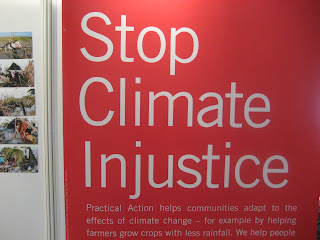Demanding climate justice in Bali
Though all 15,000 participants of the UN climate conference have come to Bali to discuss the global response to climate change, there are many points of entry to the debate. Some enter through the policy door, seeking better rules to mandate emissions reductions. Others enter through the investment door, seeking profit from carbon markets and clean technologies. And an increasing number of participants come through the global development door, seeking "climate justice" for poor populations effected by global warming. As Meena Raman of Friends of the Earth International in Malaysia explained, “We all agree that climate change is happening, but now we have to ask the question of how to share the burden of adjustment.”

Just how large that “burden of adjustment” will be is uncertain, but the UN Human Development Report released in anticipation of UN Conference proclaims that “climate change is the defining human development challenge of the 21st Century” and that “failure to respond to that challenge will stall and then reverse international efforts to reduce poverty.” The idea of climate justice comes into play when considering who will pay for climate adaptation when those countries that have done the least to cause global warming bear the greatest cost. Different groups here in Bali have even attempted to put a dollar amount to the cost of adaptation. Oxfam, for example, estimates the cost to be $50 billion per year and far more if emissions are not cut rapidly.
For many NGOs in Bali, climate change offers an opportunity to engage a new community of stakeholders and introduce ideas of environmental equity into the debate. Victoria Tauli-Corpuz, the Chairperson of the UN Permanent Forum on Indigenous Issues, described the phenomenon as a “moment to challenge traditional development paradigms.” Local organizations such as the Indonesian Civil Society Forum for Climate Justice have sprung up in the past year to address the climate challenge while more established NGOs such as UNICEF have begun to incorporate work on climate justice and adaptation into their work.
Even though several side events and exhibit booths here in Bali focus on climate justice and adaptation, they are still a relatively small percentage of the overall NGO representation at the conference. Michael Dorsey from Dartmouth College and the Durban Group for Climate Justice points out that the International Emissions Trading Association (IETA) still dominates in Bali with 336 representatives making up 8% of all NGOs listed. That is equal to more than the delegation of Greenpeace (~2%), the World Wildlife Fund (~1.6%) and Friends of the Earth (~1.5%) combined.
One silver lining that is gaining momentum here in Bali is the idea of "green jobs" created in the new energy economy. Most admit that further research on this topic is necessary to determine which sectors of society will benefit most from these jobs, but the concept resonates with many climate justice advocates in search for solutions.






